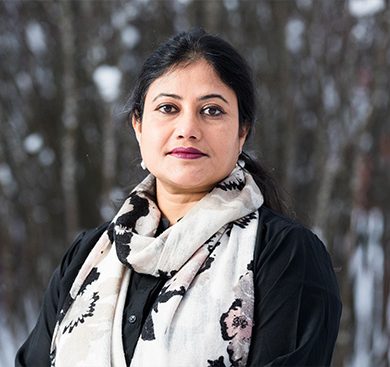The majority of the people who have died of coronavirus in Finland have been over 70 years old. Research on the older population at large has revealed that those who are socially isolated and lonely have experienced more serious physical and mental impacts than others (Koivunen et al., 2021; Müller et al., 2021).
Yet, in the Finnish North the pandemic has had both positive and negative effects on the lives of older people. In what follows, I set out to shed light on this finding.
This brief investigation explores how older people have coped and maintained relationships with those close to them during the crisis. It is based on the experiences of ten people living far from parents in need of help or care; six professionals providing care in a nursing home; and twenty older people who are living in their own homes. The data were collected during the period 2020 to 2021 as part of research related to the NIKK-AGE-Caregivers and AGE-Arctic projects.
Not everyone experienced the pandemic in the same way
Maintaining relationships with family and friends has great significance for the wellbeing of older people. The pandemic presented them with an entirely new situation: they were forbidden to meet family and loved ones in their own homes. Nursing homes were set up in order to keeping vulnerable people safe even at the risk of isolating them from normal social relationships. The situation was challenging for healthcare professionals as well as for clients’ relatives, who had to rely on digital communication to keep in contact.
Yet this does not mean that everyone experienced the pandemic in the same way. Although restrictions were in place worldwide for older people to help them stay safe in the pandemic, they should have the freedom to make decisions on their daily life (Tiilikainen et al, 2021, p. 12).
However, even with the threat of COVID-19, older people in the region who are physically strong and live on their own in rural areas have had a chance to maintain close relationships with family, friends and neighbours. They have been less negatively affected than others.
The population density in the northern part of Finland is particularly low and distances are long. According to Statistics Finland (2019), Lapland has 177,500 inhabitants. A relatively high proportion of the population falls into older age groups. However, even with the threat of COVID-19, older people in the region who are physically strong and live on their own in rural areas have had a chance to maintain close relationships with family, friends and neighbours. They have been less negatively affected than others, for example those who have memory problems, live far from persons close to them and are physically and mentally in a vulnerable situation.
Changes in daily life
Loneliness has been seen as a key problem in the lives of older people, and this is reflected in significant impacts on wellbeing, from depression to deteriorating physical fitness and an increase in the risk of death (Alpert, 2017; Chen & Schulz, 2016). However, in Lapland living alone does not always mean feeling lonely. For example, while the pandemic meant fewer visits by relatives and friends, in some cases visits by neighbours increased.
In Lapland living alone does not always mean feeling lonely. For example, while the pandemic meant fewer visits by relatives and friends, in some cases visits by neighbours increased.
Overall, however, opportunities for hobbies and recreation have been reduced and services have been curtailed. In nursing homes, it has been necessary to use protective equipment wherever people meet, which may confuse memory-impaired patients in particular. According to care professionals, the pandemic has challenged eldercare services in an unprecedented way. Care providers have followed, and continue to follow, the regular guidelines issued by THL; significantly, despite staff shortages, efforts are made to organise quality services in accordance with the client’s needs and wishes. The caregivers interviewed found themselves in a particularly difficult situation when clients with memory disorders and dementia were asking for their family members more often than usual, given that family could not visit due to Covid restrictions.
“The coronavirus didn’t change my parent’s/parents’ life all that much”
Relatives of the older people did not always find that their parents’ lives had changed significantly during the pandemic. L’s relative said, “The lives of my father and mother did not change terribly much. They themselves said so. It was the same peaceful life.” In northern, sparsely populated areas, as opposed to more urban environments (Rolandi et al. 2020), the opportunities offered by nature and residential environment to move safely outside the home were considered important. P, who lives five hundred kilometres away from her parents, stated, “We have lived in different places for over 20 years. Normally we see each other a few times a year – in the spring, fall, at Christmas and in the summer for a longer period at the cottage. We call about once a week, and sometimes we talk on Skype. My mother is 75 years old, my father 86. Mum doesn’t use a computer; she talks on the phone but, for example, can’t receive picture messages. Dad uses email and Skype, but he doesn’t have a smartphone either”.
It was the same peaceful life.
At the time of the survey, a peak of the pandemic, all of the clients’ relatives said that they had not seen their parents for more than half a year. The situation as such was not all that different from the usual one, because they did not see them daily or weekly in any case. However, especially at the beginning of the pandemic, they were all frightened. Yet, ultimately most of the relatives said that the lives of their fathers and mothers had not changed all that much: the parents were living in a place where they could walk outside, and with a mask they both could go shopping in the morning. Although face-to-face meetings with friends had diminished, talking on the telephone and on Skype with family and friends continued every week.
“Nothing can replace face-to-face meetings”
Although digital services can play an important role in communication—and did during the pandemic—being able to touch and hug people those close to them is a completely different experience for older people. In this special situation, M, a relative, mentioned about their parents, who have computer skills, that “talking via Skype is almost as if you are face to face when you see another environment; while at the cottage, I showed my mother the vegetable garden, and Dad showed me my cousin’s paintings. In the email we sent pictures. If Dad didn’t know how to use a computer and the apps, I don’t know how they would manage”. Another relative, C, said, “The corona time has not affected my mother, who is in her eighties, and her contact with family members. She knows how to take life as it is.”
H, talking about her mother, said, “the corona pandemic has not changed our communication in any way. We call just over once a week. There was a break in some of her hobbies in the spring due to the virus, but my mother didn’t feel very stressed about it. She has enough to do working in the vegetable garden, picking berries, sawing firewood and making handicrafts. As a retired nurse, she has a good understanding of the spread of the disease and how to protect herself against it”.
Not all older people have digital skills, especially those with impaired memories. N talked about her father-in-law, saying, “my husband’s 85-year-old father is memory impaired and by no means has good enough digital skills. He does not have a smartphone and cannot read or send text messages. The only way to keep in touch with him during the pandemic was to make regular phone calls”. His wellbeing clearly deteriorated during the corona crisis, when human contacts were almost entirely limited to visits by family members. He enjoys the company of people but due to his memory disorder, he does not have the ability to learn new skills, so digitalisation is of no help to his wellbeing.
Another example is that of a memory-impaired man who lives at home alone and receives services but has difficulty remembering and understanding the limitations imposed because of the coronavirus. The man feels lonely. His children wondered how they could be more present in their father’s daily life despite the restrictions due to corona. A nurse pointed out that “the man has a remote home care device, which we can also activate for the children. They can call their father during the day. They have agreed not to talk about corona. Instead, we do things together that the man likes, like heat food”.
Day service activities were closed due to corona, and care professionals became concerned about the deteriorating condition of clients living at home. Physical fitness deteriorates rapidly for some when movement becomes restricted to the four walls of the home. Social contacts are minimal as well, as fears related to corona and feelings of powerlessness and a lack of control clearly affect the mental wellbeing of clients. Care professionals wondered how to maintain the physical, mental and social fitness of their clients remotely.
Nurses noted that the pandemic had clearly worsened the condition of their clients, both physically and mentally. In this regard, a care manager mentioned that “the situation of memory-impaired clients in particular has deteriorated significantly”.
Nurses noted that the pandemic had clearly worsened the condition of their clients, both physically and mentally. In this regard, a care manager mentioned that “the situation of memory-impaired clients in particular has deteriorated significantly”. E, a nurse, stated that “due to there being so few meetings with family and relatives, the workload of the employees has increased, as clients have become dependent on a familiar caregiver”. B, also a nurse, noted that during corona, older clients became confused and needed more “attention, time and smiles” from them.
Regarding the corona restrictions, T, an older woman, mentioned that the pandemic had not affected her since the gym was open and she did her regular activities. Only the swimming pool was closed. She mentioned, “This summer I have collected several kinds of berries, which I have also enjoyed a lot. My freezer is full of berries. My daughter calls me every day. I clean my house, do my shopping and other daily tasks. I have everything in my life. I am also helping my daughter and my grandchildren. They are part of my life”.
O, an older woman born in 1945, stated, “The corona situation did not impact me very much. My son visits me in person once a week since he lives here. I do a lot of things around the house; when there were stricter limitations in place, my son and his wife bought me everything I needed from the shop. It was a very foolish decision to impose age restrictions on older people; these limited my regular visits [travelling by aeroplane] to my daughter in Helsinki.”
S, who is 70 years old, said, “Corona has not affected my life that much since family and friends live around me. I look after my grandchildren”. Last year, when the gym was closed, she went outside with her friends and took long walks, had snacks and coffee sometimes to meet friends and went jogging. They could do everything by themselves. Their time was spent taking care of their daily routine. According to Z, an older respondent, “The pandemic time has had a mainly positive effect, as we (family members, relatives) have enjoyed more time together and our environment is less polluted because there are fewer tourists and vehicles”.
In the north, I found that a person can also choose a life where social interaction is low and yet satisfying. One daughter, K, commented on her father, saying, “Father has not been personally disturbed by COVID-19. He is actually very happy now that he has a good excuse not to go anywhere.” Good community bonding was cited as being very important by the older Sámi people who live in Inari. The restrictions on access to the company of older people, who enjoy social interaction, caused negative experiences.
Mixed experiences
Mixed experiences of the impact of the pandemic were reported by older people, their relatives and care professionals over the two-year period studied. Older people living at home had a peaceful life but low levels of social interaction.
Then again, the pandemic increased contact among neighbours, family and close relatives. Although in Finland municipalities are responsible for supporting the social participation and functioning of older persons in all situations, their living environments and close relationships with family and friends are very important for their wellbeing. For memory-impaired older people, the prospect of having to rely on digital technology causes confusion and anxiety. It is difficult for them to understand how meeting those close to them can be risky. Older people who still live at home have the opportunity to move around in nature, for example, gardening and picking berries, which is an important source of wellbeing. In one instance, older people living at home found the outside environment more peaceful and cleaner during the pandemic, as there were fewer tourists and less traffic.
REFERENCES:
Alpert, Patricia (2017) Self-perception of social isolation and loneliness in older adults. Home Health Care Management & Practice 29(4), 249–252.
Chen, Yi-Ru Regina & Schulz, Peter (2016). The effect of information communication technology interventions on reducing social isolation in the elderly: A systematic review. Journal of Medical Internet Research 18(1), 18.
Koivunen, Kaisa, Erja Portegijs, Elina Sillanpää, Johanna Eronen, Katja Kokko, Taina Rantanen (2021). Maintenance of high quality of life as an indicator of resilience during COVID‑19 social distancing among community‑dwelling older adults in Finland. Quality of Life Research, Springer.
Müller, F., Röhr, S., Reininghaus, U., & Riedel-Heller, S. G. (2021). Social isolation and loneliness during COVID-19 lockdown: Associations with depressive symptoms in the German old age population. International Journal of Environmental Research and Public Health, 18(7), 3615.
Rolandi, Elena, Roberta Vaccaro, Simona Abbondanza, Georgia, Casanova, Laura, Pettinato, Mauro, Colombo & Antonio, Guaita. (2020). Loneliness and social engagement in older adults: Based in Lombardy during the COVID-19 Lockdown: The long-term effects of a course on social networking sites use. International Journal of Environmental Research and Public Health 17(21), 7912.
Statistics Finland (2019). Population projection 2019: Population according to age and sex by area, 2019–2040.
Tiilikainen, E., Lisko I., Kekkonen, E., Solomon, A., Ngandu, T., Kivipelto, M. and Kulmala, J. (2021). Everyday Life Meaningfulness for the Community-Dwelling Oldest Old During the COVID-19 Pandemic. Frontiers in Psychology, 12, Article 716428






